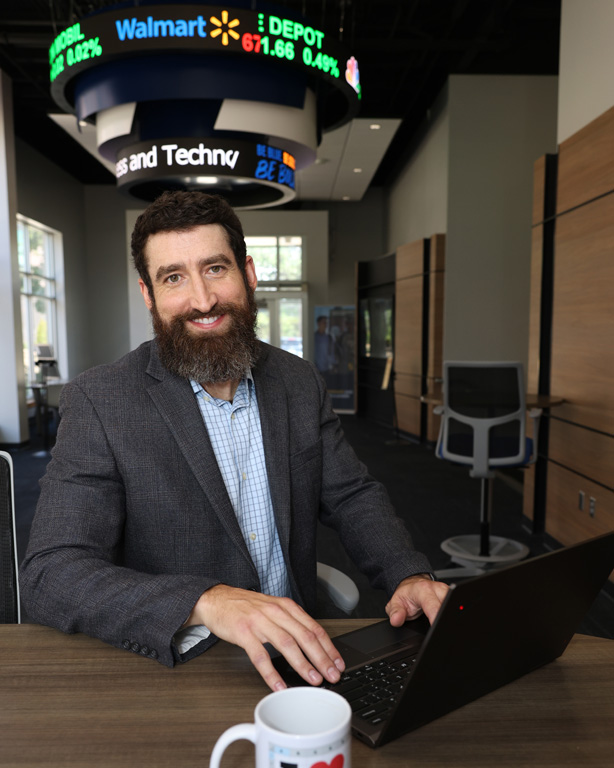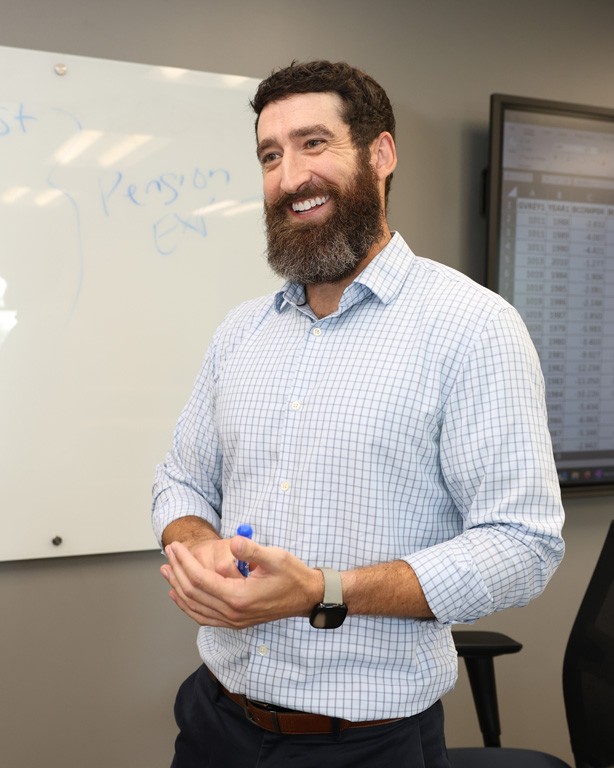
THIS STORY IS FEATURED IN THE 2024 NEW FRONTIERS MAGAZINE
By TIFFANY STOIBER
UNK Online
KEARNEY – Matt Bjornsen felt a compelling call back to his roots.
After enriching his career both in the field and as a faculty member at Oklahoma State University, the associate professor of accounting at the University of Nebraska at Kearney was drawn back to his alma mater and hometown.
Bjornsen found in UNK a place where he could work closely with students and contribute to research that directly impacts the accounting field. This return allowed him to engage in meaningful research with immediate, tangible effects, while also mentoring the next generation of accountants.
“As an alumnus of UNK, I truly believe in the institution and wanted to be a part of its success,” said Bjornsen. “Additionally, UNK’s student-focused mission aligned with my personal attitude regarding academia, and I believed I could establish a fulfilling and satisfying career for myself in such an environment.
“Finally, the chance to be closer to my family was a significant factor. Having grown up in the area, I was eager to return and benefit from the work-life balance and support system provided.”
At UNK, Bjornsen leverages his extensive practical experience to enrich his teaching and research. His projects explore critical issues such as classroom incivility and the relationship between managerial ability and financial reporting quality. This dual focus not only enhances his classes but also provides valuable insights for the accounting profession.

At the beginning of your career, you worked as both an accountant and an auditor. What drew you to higher education?
I found myself drawn to academia for several reasons. In addition to the energy generated by the student population, the setting offered more independence to pursue my own interests, rather than being confined to client work. I also wanted to help mentor and guide the upcoming generation of accountants, and I hoped that doing so would positively impact the accounting field.
How do you feel your research benefits your teaching here at UNK, and vice versa?
My research allows me to explore accounting theory at a very deep level, often leading to more thought-provoking classes for students. On the other hand, teaching can help generate new research ideas, as interacting with students often sparks ideas and leads me to investigate areas that directly relate to their learning. This relationship between teaching and research is important as it helps me stay current on industry knowledge while hopefully also keeping my research relevant and impactful.
Which research projects are you working on currently that you are most excited about?
One project investigates incivility in the accounting classroom by surveying accounting faculty members from across the nation about their perceptions of student behavior in the classroom. The hope is that this study’s findings will prove useful for understanding and creating an ideal learning environment. Another project examines the relationship between managerial ability and financial statement comparability; in other words, it connects a company’s leadership team to the quality of the organization’s financial reporting.
Aside from adding to the larger body of research, how do you see your research impacting accountants in the field and/or other faculty currently teaching?
I see my work as having an impact on both working accountants and fellow faculty members as I try to mainly work on student-focused and practitioner-oriented studies. My goal is to provide relevant insights to both parties and in doing so, have a meaningful impact on each field going forward.
What part of the research process do you find that you most enjoy?
The part of research I most enjoy is the data exploration. There’s satisfaction in digging into a dataset, cleaning
and organizing it, and transforming raw information into meaningful insights. While there can be frustrating parts, analyzing data and numbers tends to be rewarding in that it leads to the creation of a clean, high-quality dataset capable of answering meaningful questions. In other words, it’s often where research questions turn into meaningful results!
How do you continue to find new research topics and questions that you wish to pursue?
Although I initially worried about this early in my academic career, I typically find new topics/questions easily and organically. It is important to stay current by reading newly published research, as it helps identify gaps in the literature. In addition, interacting with colleagues, both within and outside of UNK, often makes me aware of emerging trends and unexplored areas. Finally, research ideas have arisen directly from my teaching experiences, interacting with students and fellow educators.
Many of your research projects are collaborative with others. How does the collaborative process work for you, and what do you enjoy about working with others in your research?
We each typically take ownership of a particular area. For example, one person might focus on the data, while another works on fine-tuning our research methods and contribution to the literature, while another focuses on physically writing a majority of the first draft of the paper. The goal is to utilize our strengths and work efficiently. We rely on multiple methods to communicate, such as phone calls, Zoom meetings, emails and even text messages. Doing so keeps things interesting, helps maintain camaraderie and accommodates our communication preferences.
How does UNK support your research endeavors and encourage you to pursue topics you are passionate about?
UNK remains flexible regarding publication outlets by utilizing the ABDC (Australian Business Deans Council) journal quality list and Cabells (an organization that collects quality-relevant data regarding academic journals) to gauge the quality and impact of journals. In addition, UNK encourages cross-disciplinary research and allows for faculty to petition for other high-quality journals, even if they aren’t included on the ABDC or Cabells lists. The university also covers the cost of attending conferences, as well as journal submission fees, both of which can be barriers to producing high-quality research.
In addition to research, you also spend much of your time teaching UNK students. What do you enjoy most about that part of your job?
I find it rewarding to watch students learn and grow as people and professionals. They are at UNK during a very important time of their lives, and I enjoy seeing their confidence increase as they learn and hone new skills. I also try to expose them to various internship opportunities, help them explore different career paths and do anything else I can to help them be successful in the real world (such as writing letters of recommendation, reviewing resumes or helping to facilitate networking events). Overall, I enjoy supporting UNK students and hope to make a difference in their lives and careers.
PHOTOS BY ERIKA PRITCHARD, UNK COMMUNICATIONS

MATT BJORNSEN
Title: Associate Professor, Accounting
College: Business and Technology
Education: Ph.D. in accounting, University of Nebraska-Lincoln, 2016; Master of Business Administration in accounting, University of Nebraska at Kearney, 2010; Bachelor of Science in accounting, UNK, 2008; Certified Public Accountant, 2011-Present.
Years at UNK: 5
Areas of Research/Specialization: Financial accounting, financial reporting, student behavior and wellness.
Courses Taught: Principles of Accounting I-II and Intermediate Accounting I-II.
Recent Published Articles: “Developing and Assessing Wellbeing in the Accounting Curriculum,” Advances in Accounting Education, 2024. “Collective Bargaining and Strategic Disclosure in Earnings Conference Calls,” Journal of Accounting, Auditing, and Finance, 2024. “The Effect of Analyst Conservatism on Meeting the Consensus via Earnings Management,” Accounting Horizons, 2023.

